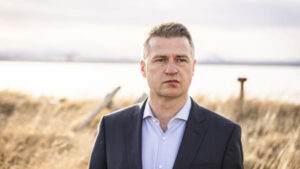Icelandic Whistleblower wins WIN WIN Gothenburg Sustainability Award

Icelandic whistleblower Jóhannes Stefánsson who, with his life at stake, led the revelation of a widespread corruption scandal connected to fishing quotas in Namibia has emerged this year’s winner of the WIN WIN Gothenburg Sustainability Award, a sustainability award.
The award comes with a prize of 1 million SEK which will be presented to the winner at an award ceremony in Gothenburg in October.
Since successful anti-corruption initiatives are crucial for sustainable development all over the world, this year, WIN WIN Gothenburg Sustainability Award is recognising individuals and organizations that fight corruption.
Between 2011 and 2016 Jóhannes Stefánsson had a leading position in the Icelandic fishing company Samherji. After some time, he realized that the company was involved in widespread corruption connected to fishing quotas in Namibia.
With thousands of data files on his computer, he left his position in protest. During his five years at the company, he learned about the ongoing corruption culture. When he chose to leave his position, there were 30, 000 data files left on his computer. These files are the foundation of ‘Fishrot Files’, which three years later was published through WikiLeaks and sparked a great and important debate on corruption in the fishing industry.
In 2019 WikiLeaks published the beginning of “the Fishrot Files” – a revelation that came to shake business leaders and the political elite. Jóhannes Stefánsson was harassed, threatened and poisoned but that did not stop him. He went on to demonstrate that individuals in the corporate world can join the fight against corruption.
The revelation shows how Samherjis paid bribes to domestic officials, so-called “sharks”, to get specific fishing quotas. The bribes amount to several million dollars just over four years. Even the fishing company Fishcor, owned by the Namibian government, was connected to the scandal. In 2019 Namibian Minister of Fisheries and Marine Resources, Bernhard Esau, and the country’s Minister of Justice, Sacky Shanghala, resigned following allegations of bribery by Samherji. Even Icelandic actors have been linked to bribes, corruption and Namibian politicians. Since the revelation, Stefaìnsson has been living a life with constant harassment and threats and attempts on his life.
“I first started working on the revelation in July 2016, and it has been at a great cost. When I left Samherji, it took me a while to understand what I had been through. But when I realised the magnitude of the financial crimes and corruption – how serious the consequences for the Namibian people were – I never hesitated about what I had to do. Therefore, it is a great honour to receive such recognition and to be awarded the WIN WIN Gothenburg Sustainability Award 2021. It also means important financial support that enables us to continue this ongoing fight that is far from over,” Joìhannes Stefaìnsson says.
His bravery according to the jury, has demonstrated great courage and selflessness in his fight against misuse of power and corruption and highlights the importance of individual acts of integrity, not least within the sectors of industry and commerce.
“Unfortunately, those with the courage to fight corruption and misuse of power most often have to pay a steep price, and there’s no exception for Jóhannes Stefánsson. With an unfaltering determination, Stefánsson has defied reoccurring harassment, threats towards his life and attempts on his life to keep up his fight. This is an individual who has overthrown an entire industry and strengthened justice for the people; a real hero, in other words, who we are proud to present as this year’s winner,” Emma Dalväg, chairperson of the jury said.
“Corruption is one of the greatest obstacles to global sustainable development. It affects the world’s most vulnerable the hardest and has a negative impact on society as a whole, as well as the planet itself,” the jury explains.
Political corruption leads to a lack of trust in government, making it increasingly difficult to implement environmental policy reform according to the Swedish Anti-Corruption Institute (IMM).
The OECD, World Bank and the IMF say $4 trillion is lost to corruption every year. This can be compared with the $2,930 billion: the financial gap that needs to be filled in order for us to achieve the UN Sustainable Development Goals by 2030.
By Theodora Aidoo
Copyright ©2021 by NewsBridge Africa
All rights reserved. This article or any portion thereof may not be reproduced or used in any manner whatsoever without the express written permission of the publisher except for the use of brief quotations in reviews.
